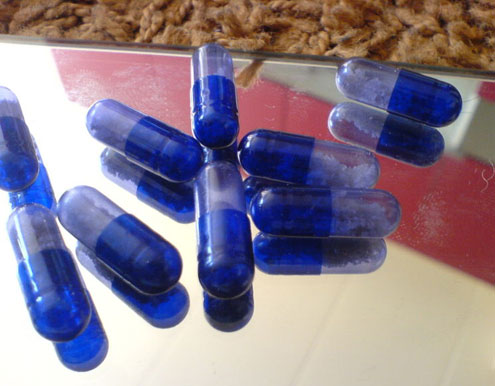Is a once-waning fad making a comeback in a dangerous new form?
Washington, DC – The White House Office of National Drug Control Policy (ONDCP) is warning public health and safety leaders across the country about a dangerous new drug threat coming from Canada. Ecstasy laced with methamphetamine (meth) has been entering the United States illegal drug markets, particularly in northern border states. Intelligence reports indicate that once smuggled into the U.S., the meth-laced Ecstasy is then being distributed throughout the country.
The dangerous poly-drug combination of methamphetamine and Ecstasy can have severe health consequences, especially as both drugs have toxic effects on the brain. They both can interfere with the body’s ability to regulate temperature, leading to sharp increases in body temperature (hyperthermia), which can result in liver, kidney, and cardiovascular system failure and death.

The potential for a life-threatening or fatal overdose is also increased when meth-laced Ecstasy is combined with alcohol. Recent laboratory research suggests that Ecstasy and meth combinations may produce greater adverse neurochemical and behavioral effects than either drug alone.
John Walters, the Nation’s “Drug Czar,” said, “This ‘Extreme Ecstasy’ is a disturbing development in what has been one of the most significant international achievements against the illicit drug trade. Historic progress against Ecstasy availability and use is in jeopardy of being rolled back by Canadian criminal organizations. Desperate to develop their client base, they are dangerously altering a product for which demand by youth and young adults had plummeted, and are exploiting vulnerabilities along our shared border. This is alarming for the youth of both Canada and the United States.”
Ecstasy use in the United States rose in the late 1990s with the rise of the ‘Rave’ culture, however due to the well-coordinated national and international response - Ecstasy use in the U.S. diminished in the early 2000s. In fact, the U.S. witnessed a 54 percent reduction since 2001 in the number of United States teens using Ecstasy in the past month, however recent data show progress against the drug has ebbed. The number of people in the U.S. who reported that they tried Ecstasy for the first time during the past year increased 40 percent between 2005 and 2006 – from 615,000 to 860,000. One-third of these new users in 2006 were under age 18 when they started using Ecstasy.

And while still lower than its peak in 2002, past-month Ecstasy use has been increasing over the last two years among young adults aged 18-25. An estimated 326,000 young adults reported past-month Ecstasy use in 2006, compared to 231,000 in 2004. These increases coincide with increased trafficking of Ecstasy from Canada.
Additionally, the latest Monitoring the Future Study, which tracks teen attitudes and behavior with respect to drug use, found decreases in the perception of risk of taking Ecstasy occasionally among 8th and 10th graders (-7% and -4%, respectively). After years of increased perception of risk for Ecstasy use, today’s young people are not getting the message that Ecstasy use is dangerous and potentially deadly.
Prior to 2003, Europe (primarily The Netherlands and Belgium) was the predominant source of Ecstasy consumed in the United States. Increased cooperation among U.S. and European governments, combined with improved law enforcement operations and mass media reports, effectively dismantled the European – U.S. Ecstasy trade. However, U.S. and Canadian intelligence reports indicate that Canada-based drug trafficking organizations are attempting to fill the supply void, and have drastically increased their Ecstasy production and trafficking.
The Royal Canadian Mounted Police (RCMP) estimates that the current combined production capacity of Canadian Ecstasy laboratories exceeds 2 million tablets per week. Federal, State, and local law enforcement agencies along the U.S. – Canada border report large increases in the flow of Ecstasy from Canada into the United States. In 2003, 568,220 dosage units of Ecstasy were seized federally in the ten Northern border states; in 2006, 5,485,619 dosage units were seized.Alarmingly, more than 55 percent of the Ecstasy samples seized in the United States last year contained methamphetamine.
Cutting their product with less-expensive methamphetamine boosts profits for Canadian Ecstasy producers, likely increases the addictive potential of their product, and effectively gives a dangerous “face lift” to a designer drug that had fallen out of fashion with young American drug users.
Federal law enforcement officers are working with the RCMP to put greater pressure on Canadian Ecstasy producers through increased intelligence sharing and coordinated enforcement operations, and RCMP officials are focusing their efforts on the importation of precursor chemicals used in drug production. In the meantime, Director Walters is urging State and local public health officials to reinvigorate their prevention efforts, to enhance educational outreach to youth, parents, school systems, emergency departments, medical examiners, poison control centers, and law enforcement agencies regarding the hazards of Ecstasy and methamphetamine, to shore up treatment systems to look for and address the unique and well known challenges of meth addiction.
“We cannot allow our young people to once again be victimized by the ‘Rave’ culture, ‘designer’ drugs, or the myth that drug use is safe,” said Director Walters. “We cannot afford to be complacent with the progress made against Ecstasy since 2001. Just as we must teach new generations of children to read, we must continue to educate new generations of young people on the harms of drug use.”